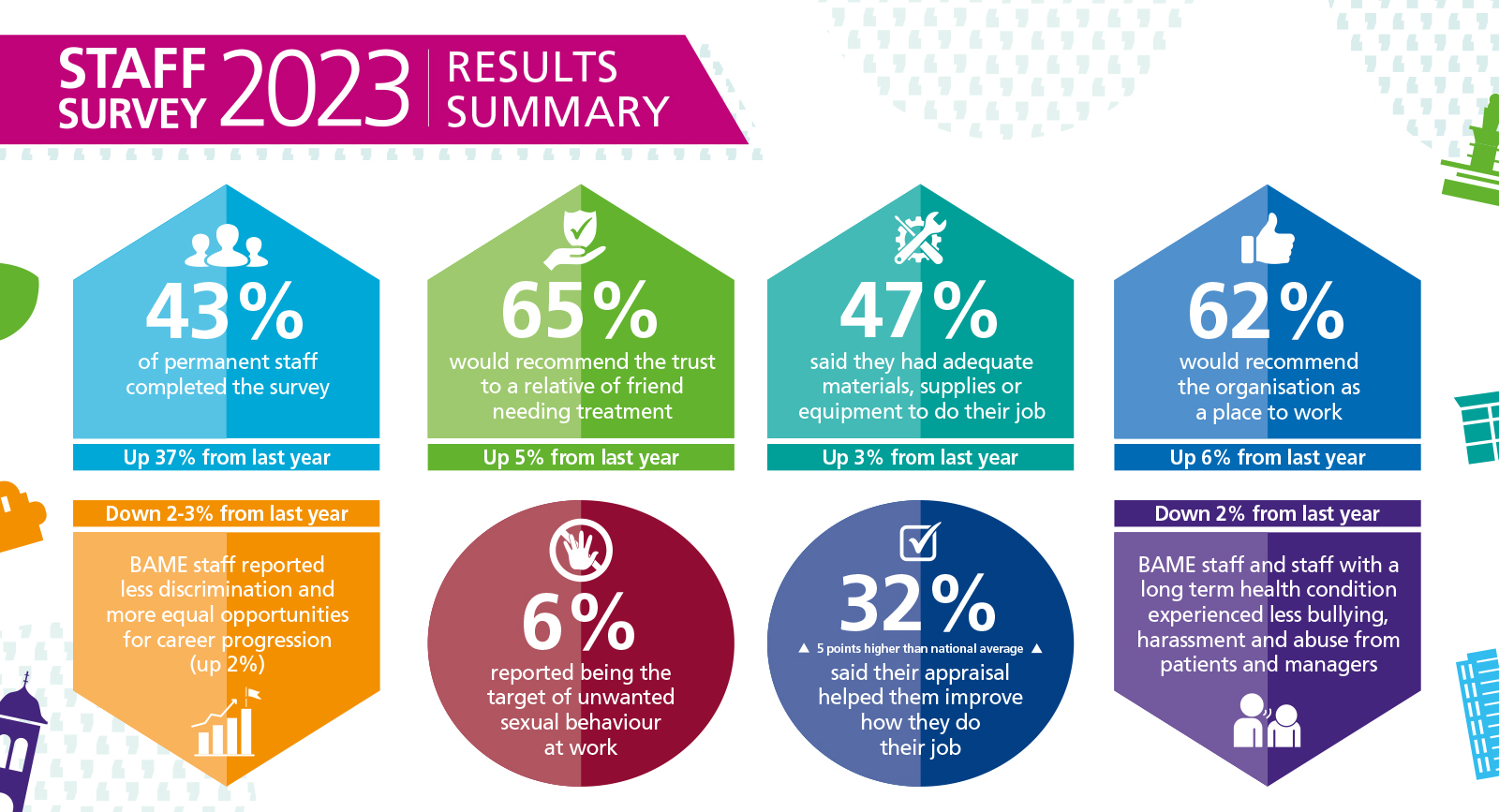Sweeping improvements seen in 2023 staff survey

The majority of our staff are very happy with the standard of care we provide in our hospitals and would recommend them if a friend or relative needed treatment.
The latest NHS staff survey results show that our confidence in the quality of treatment we provide our patients is now higher than average across the country.
Two-thirds of staff who took part in the survey said they would recommend our hospitals to friends or relatives, a small but significant increase from a year ago.
There was a similar increase in the proportion of colleagues (now 62%) who would recommend the organisation as a place to work.
These finding are among positive indicators that suggest morale and engagement amongst colleagues is steadily improving despite operational pressures.
We scored higher than last year on each of the national NHS People Promise themes, such as being compassionate and inclusive, being recognised and rewarded, and being safe and healthy.
For example, among BAME staff (who comprise a majority of the workforce)
- Fewer said they were discriminated against by managers or colleagues
- Fewer experienced bullying, harassment and abuse from staff or patients
- More believed there were equal opportunities for career progression
There were also welcome reductions in the proportion of colleagues with a long-term condition or illness who experienced harassment, bullying or abuse.
This is all a tribute to the efforts of colleagues across our hospitals, even though we continue to lag in many areas behind our peers among other acute providers.
More than half our staff believe they don’t have adequate materials, supplies or equipment to do their work, for example, the most in our benchmarking group.
Taking action with what we've said
Our hospitals and services will review their survey results, which are broken down to departmental level, to inform and refresh local plans for the forthcoming year.
Although finances are tight, managers should focus on ensuring staff have regular appraisals, work to realistic time pressures, and have opportunities to work flexibly.
Shane DeGaris, group chief executive, said: “The survey shows we have made significant improvements under all the themes of the NHS People Promise, and I would like to take this opportunity to thank everyone who shared their views.
"We are committed to listening to the voices of our staff and will do everything we can to address the issues you raised through our operating plans for the year ahead.
“We each have a role to play here to ensure not only we provide the best possible care for patients but also our hospitals are outstanding and inclusive places to work.”
Notes
- 43% of permanent staff completed the survey (up from 37%)
- 75% say care of patients and service users is our top priority (up 2 points)
- 65% would be happy with their family receiving our standard of care (up 5)
- 62% would recommend the organisation as a place to work (up 6)
- 47% have adequate materials, supplies or equipment to do their job (up 3)
- 32% believe the organisation has enough staff to do our jobs properly (up 7)
- 75% receive an annual appraisal (compared to an NHS average of 84%)
- 32% said their appraisal helped them improve how they do their job (up 6)
- Our scores valuing appraisals are 5 points higher than the national average
- About 6% reported being the target of unwanted sexual behaviour at work: this question was asked for the first time following the launch of the NHS sexual safety charter last year
Among BAME staff (who represent 60% of our workforce):
- 17% experienced discrimination at work from a colleague (down 3)
- 29% experienced harassment bullying or abuse from staff (down 2-3)
- 28% experienced harassment, bullying or abuse from patients (down 2)
- 45% believe there are equal opportunities for career progression (up 2)
Of staff with a long-term condition or illness, 27% experienced harassment, bullying or abuse from patients (down 2), and 12% from managers (down 2).
